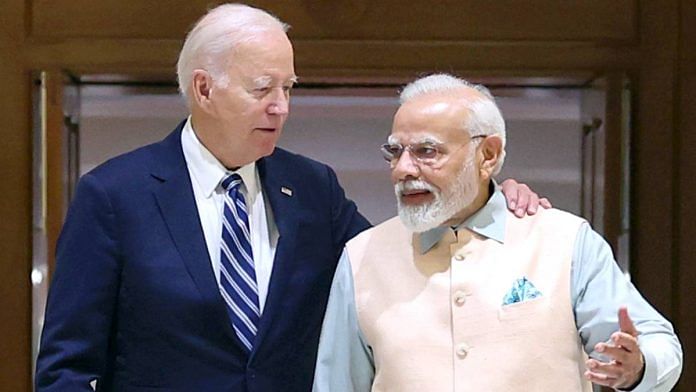New Delhi: India and US will work on improving coordinations on planetary defence to protect the Earth and space assets from the hazardous impact of asteroids and near-Earth objects, along with planning joint crewed mission to the International Space Station, said a joint statement released by the two countries shortly after US President Joe Biden and Indian Prime Minister Narendra Modi held bilateral talks in New Delhi Friday, ahead of the ongoing G20 Summit.
Biden reached India Friday to take part in the two-day G20 Summit being held under India’s presidency over the weekend.
The US President congratulated PM Modi and ISRO scientists and engineers of the Indian Space Research Organisation (ISRO) on Chandrayaan-3’s historic landing at the south polar region of the Moon, as well as the successful launch of India’s first solar mission, Aditya-L1 last month.
The statement said that while India and the US are working towards establishing a working group for commercial space collaboration under the existing India-U.S. Civil Space Joint Working Group, ISRO and NASA have commenced discussions on modalities, capacity building, and training for mounting a joint effort to the International Space Station in 2024, and are continuing efforts to finalise a strategic framework for human space flight cooperation by the end of 2023.
“India and the United States also intend to increase coordination on planetary defence to protect planet Earth and space assets from the impact of asteroids and near-Earth objects, including US support for India’s participation in asteroid detection and tracking via the Minor Planet Center,” the statement said.
The Minor Planet Center is the official body responsible for observing and reporting on minor planets, comets, and natural satellites. Founded in 1947, it operates at the Smithsonian Astrophysical Observatory under the auspices of the International Astronomical Union.
In 2022, NASA had successfully demonstrated its ability to deflect an asteroid from its path.
Before that in 2019, India had demonstrated an anti-satellite missile test, known as ASAT, to destroy satellites.
During Modi’s visit to the US in June, India and US had signed an MoU on a semiconductor supply chain and innovation partnership as a significant step in the coordination of the two countries’s semiconductor incentive programmes.
The leaders Friday reiterated their support for building resilient global semiconductor supply chains, noting in this respect a multi-year initiative of Microchip Technology Inc., to invest approximately $300 million in expanding its research and development presence in India and Advanced Micro Device’s announcement to invest $400 million in India over the next five years to expand research, development, and engineering operations in India.
Modi and Biden also welcomed the call for proposals released by the US’s National Science Foundation (NSF) and India’s Ministry of Electronics and Information Technology, to foster academic and industrial collaboration in semiconductor research, next generation communication systems, cyber-security, sustainability and green technologies, and intelligent transportation systems.
The two leaders reaffirmed technology’s defining role in deepening our strategic partnership and lauded ongoing efforts through the India-U.S. Initiative on Critical and Emerging Technology (iCET) to build open, accessible, secure, and resilient technology ecosystems and value chains, based on mutual confidence and trust, which reinforce our shared values and democratic institutions.
The US and India intend to undertake a midterm review of iCET this month to continue to drive momentum toward the next annual iCET review, co-led by the National Security Advisors of both countries, in early 2024.
Also read: MoUs with Hasina, infra talks with Mauritius PM — Modi’s bilateral meetings ahead of G20 summit
Other collaborations
Efforts to start a joint Indo-U.S. Quantum Coordination Mechanism to facilitate collaboration among industry, academia, and government had begun in June, and Biden acknowledged the participation of the S.N. Bose National Centre for Basic Sciences, Kolkata, as a member of the Quantum Economic Development Consortium. The statement also mentions the Indian Institute of Technology (IIT) Bombay joining the Chicago Quantum Exchange as an international partner.
Modi and Biden hailed the signing of an Implementation Arrangement between the NSF and India’s Department of Biotechnology to enable scientific and technological research collaborations in biotechnology and biomanufacturing innovations.
The two leaders also reaffirmed that both administrations will promote policies to facilitate greater technology sharing, co-development, and co-production opportunities between Indian and US industry, government and academic institutions.
They also welcomed the signing of an MoU between Indian universities, represented by the Council of Indian Institutes of Technology (IIT Council), and the Association of American Universities (AAU) to establish the India-U.S. Global Challenges Institute, with a combined initial commitment of at least US$10 million.
The Global Challenges Institute will bring together leading research and higher-education institutions from across our two nations, including beyond AAU and IIT membership, to advance new frontiers in science and technology, spanning collaboration in sustainable energy and agriculture, health and pandemic preparedness, semiconductor technology and manufacturing, advanced materials, telecommunications, artificial intelligence, and quantum science.
(Edited by Poulomi Banerjee)
Also read: New Delhi ‘turned down’ White House requests for more press access to Biden-Modi bilateral meet



